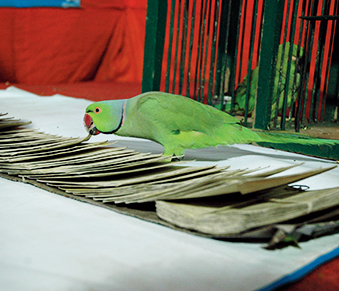Sir — If the ever-increasing number of advertisements put up by astrologers in prominent dailies is a sign of their rising popularity, it is indeed worrying. Even a decade ago, there were far fewer of these ads. The growing demand for astrologers can perhaps be attributed to the frustration of common people resulting from high rates of unemployment and the falling value of the rupee. Such uncertainties drive people to seek out astrologers who charge a pretty penny to dish out sugar-coated predictions. Not only is there little scope to find employment, but there is also advanced mechanization which is making human workers, especially those doing menial manual labour, redundant.
The government should ensure that people are aware of the pitfalls of spending their hard-earned money on charlatans. Newspapers could help too; they should print an advisory along with the advertisements highlighting the perils of falling prey to superstition. More important, the State should work towards alleviating the troubles of the people. This will automatically make them more secure about their future and less eager to rush to astrologers and fortune-tellers.
Srikanta Bhattacharjee,
Calcutta
Sir — Astrology predicts the influence that planetary positions have on humans. That sentence is enough to underline the ludicrousness of astrology. Yet, people make irrational life choices based on the belief that celestial bodies will affect these. Worse, they participate in rituals that they think can alter the course of inanimate objects in outer space.
But one must consider the actual reason behind such unreasonableness. In India, given its deep socio-economic schisms, it is easier to sink to the bottom than to rise to the top. Institutional barriers in the way of progress are many — lack of access to education, housing, sanitation, employment, good health and so on. Astrology promises the disadvantaged a shortcut — no matter how illusory — to the top. The problem of people falling for a pseudo-science like astrology will never really go away unless scientists get together and understand their need for it. Rooting out socio-economic divisions will automatically loosen the grip that astrology has over people.
Aditya Bannerjee,
Gurgaon
Gender gap in dating apps
Sir — A survey by an Indian dating application has thrown up a troubling picture. Only 26 per cent of the 20,000 urban Indians who use dating apps and were part of the survey are women. The primary reason for this gender gap may be the harassment that women are subjected to on these apps. The Indian male seems to have no idea as to what dating entails. The tendency is to equate it with sending unsolicited pictures of genitalia and/or making untoward and lewd comments. Such an experience is enough to turn anyone off at the very idea of finding a match online.
Roshni Sen,
Calcutta
ASI shadow on Sun Temple
Sir — The Sun Temple in Konark has stood witness to innumerable social, cultural, economic as well as scientific developments over the years. Unfortunately, the many secrets that are yet to be uncovered from the etchings on its facade may remain undiscovered. It is worrying that the Archaeological Survey of India is allegedly obliterating the carvings on the temple under the garb of renovation. The Sun Temple will be left as a shadow of its former glorious self.
The Union culture minister, Mahesh Sharma, and the ASI have assured that no carving at the temple has been replaced. A visit to the temple to ensure that this is indeed the case may be necessary. A timely intervention may salvage whatever is left of this historical edifice for future generations to admire and learn from.
Sanjukta Banerjee,
Keonjhar
Sir — It is difficult to believe that the reported disappearance of sculptures adorning the Sun Temple in Konark is innocent. Such sculptures fetch a high price in the international black market for art. If the allegation is proven to be true, the ASI must be made to answer for its grievous lapse.
Rima Roy,
Calcutta










